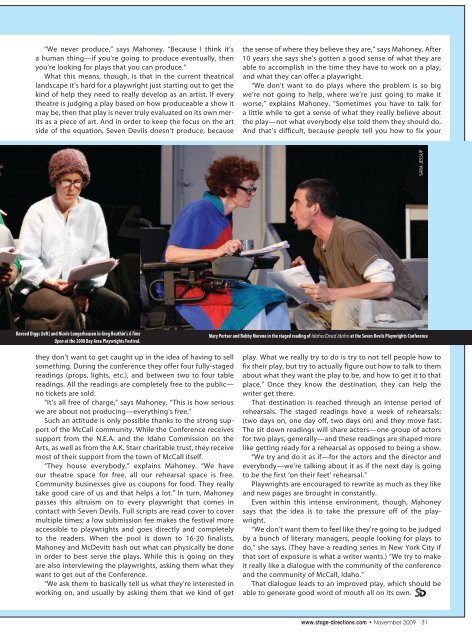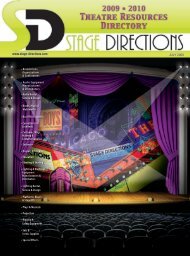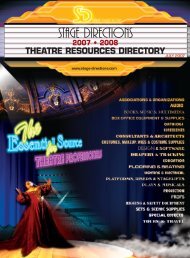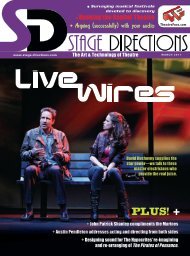Download a PDF - Stage Directions Magazine
Download a PDF - Stage Directions Magazine
Download a PDF - Stage Directions Magazine
Create successful ePaper yourself
Turn your PDF publications into a flip-book with our unique Google optimized e-Paper software.
“We never produce,” says Mahoney. “Because I think it’s<br />
a human thing—if you’re going to produce eventually, then<br />
you’re looking for plays that you can produce.”<br />
What this means, though, is that in the current theatrical<br />
landscape it’s hard for a playwright just starting out to get the<br />
kind of help they need to really develop as an artist. If every<br />
theatre is judging a play based on how produceable a show it<br />
may be, then that play is never truly evaluated on its own merits<br />
as a piece of art. And in order to keep the focus on the art<br />
side of the equation, Seven Devils doesn’t produce, because<br />
the sense of where they believe they are,” says Mahoney. After<br />
10 years she says she’s gotten a good sense of what they are<br />
able to accomplish in the time they have to work on a play,<br />
and what they can offer a playwright.<br />
“We don’t want to do plays where the problem is so big<br />
we’re not going to help, where we’re just going to make it<br />
worse,” explains Mahoney. “Sometimes you have to talk for<br />
a little while to get a sense of what they really believe about<br />
the play—not what everybody else told them they should do.<br />
And that’s difficult, because people tell you how to fix your<br />
Sara Jessup<br />
Daveed Diggs (left) and Nicole Lungerhausen in Greg Beuthin’s A Time<br />
Upon at the 2008 Bay Area Playwrights Festival.<br />
Mary Portser and Bobby Moreno in the staged reading of Idaho/Dead Idaho at the Seven Devils Playwrights Conference<br />
they don’t want to get caught up in the idea of having to sell<br />
something. During the conference they offer four fully-staged<br />
readings (props, lights, etc.), and between two to four table<br />
readings. All the readings are completely free to the public—<br />
no tickets are sold.<br />
“It’s all free of charge,” says Mahoney. “This is how serious<br />
we are about not producing—everything’s free.”<br />
Such an attitude is only possible thanks to the strong support<br />
of the McCall community. While the Conference receives<br />
support from the N.E.A. and the Idaho Commission on the<br />
Arts, as well as from the A.K. Starr charitable trust, they receive<br />
most of their support from the town of McCall itself.<br />
“They house everybody,” explains Mahoney. “We have<br />
our theatre space for free, all our rehearsal space is free.<br />
Community businesses give us coupons for food. They really<br />
take good care of us and that helps a lot.” In turn, Mahoney<br />
passes this altruism on to every playwright that comes in<br />
contact with Seven Devils. Full scripts are read cover to cover<br />
multiple times; a low submission fee makes the festival more<br />
accessible to playwrights and goes directly and completely<br />
to the readers. When the pool is down to 16-20 finalists,<br />
Mahoney and McDevitt hash out what can physically be done<br />
in order to best serve the plays. While this is going on they<br />
are also interviewing the playwrights, asking them what they<br />
want to get out of the Conference.<br />
“We ask them to basically tell us what they’re interested in<br />
working on, and usually by asking them that we kind of get<br />
play. What we really try to do is try to not tell people how to<br />
fix their play, but try to actually figure out how to talk to them<br />
about what they want the play to be, and how to get it to that<br />
place.” Once they know the destination, they can help the<br />
writer get there.<br />
That destination is reached through an intense period of<br />
rehearsals. The staged readings have a week of rehearsals:<br />
(two days on, one day off, two days on) and they move fast.<br />
The sit down readings will share actors—one group of actors<br />
for two plays, generally—and these readings are shaped more<br />
like getting ready for a rehearsal as opposed to being a show.<br />
“We try and do it as if—for the actors and the director and<br />
everybody—we’re talking about it as if the next day is going<br />
to be the first ‘on their feet’ rehearsal.”<br />
Playwrights are encouraged to rewrite as much as they like<br />
and new pages are brought in constantly.<br />
Even within this intense environment, though, Mahoney<br />
says that the idea is to take the pressure off of the playwright.<br />
“We don’t want them to feel like they’re going to be judged<br />
by a bunch of literary managers, people looking for plays to<br />
do,” she says. (They have a reading series in New York City if<br />
that sort of exposure is what a writer wants.) “We try to make<br />
it really like a dialogue with the community of the conference<br />
and the community of McCall, Idaho.”<br />
That dialogue leads to an improved play, which should be<br />
able to generate good word of mouth all on its own.<br />
www.stage-directions.com • November 2009 31

















